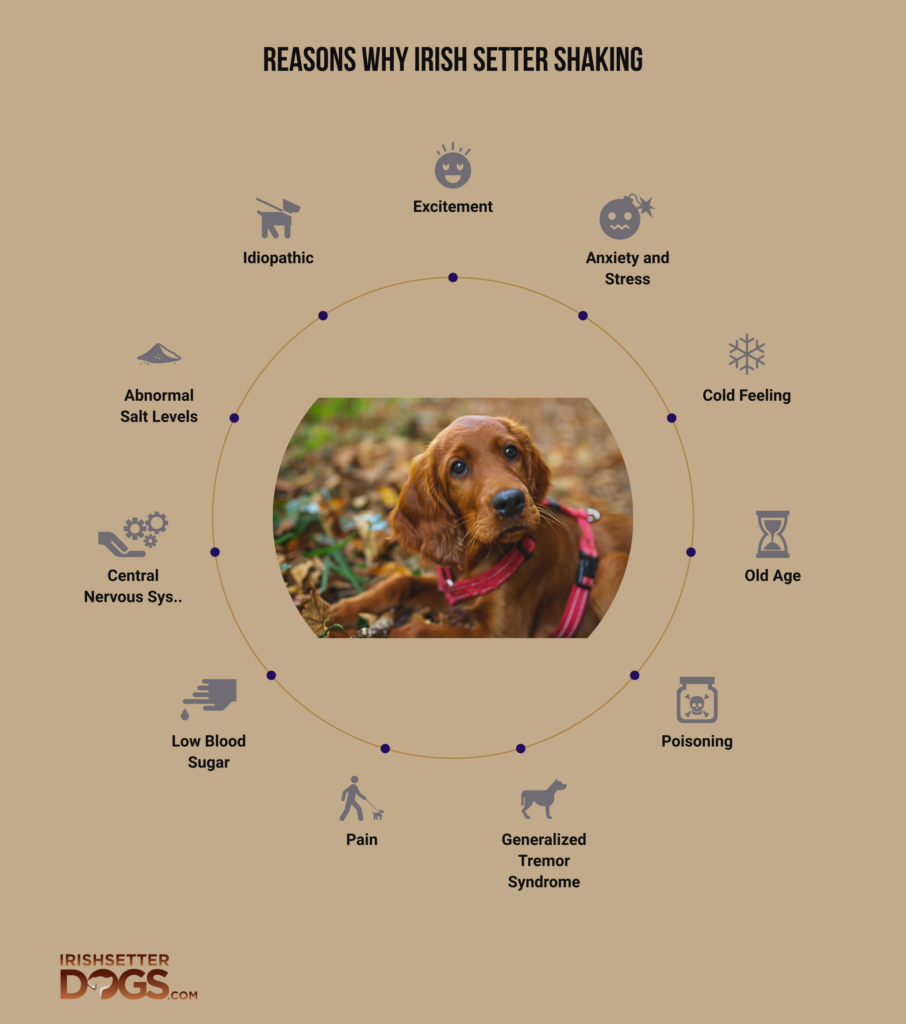Does your Irish Setter shake? Your Irish Setter shaking is alarming. Although occasional shaking might be dismissed as meaningless, there is a reason why it occurs. Even when it’s not chilly outdoors, many dogs shiver or shake. Irish setters are particularly prone to this. Irish Setter shaking may be a natural occurrence for some puppies or a red flag that something is wrong. Your Irish Setter’s shaking might be caused by various factors, from unimportant to grave.
Various things, including fear, coldness, underlying medical issues, poisoning, aging, and discomfort, may cause Irish Setter shaking. While shaking is often not a reason for concern, it should be taken seriously since it might indicate a dangerous underlying health condition.
Your veterinarian can advise you on whether or not to seek therapy, but be aware that certain causes of Irish Setter shivering are a little elusive. We’ll examine the causes of Irish Setter shaking in this post, along with remedies. Let’s discover the causes of an Irish Setter’s shaking so you can decide if there is an issue.
Shaking of An Irish Setter

When referring to shaking in an Irish Setter, two distinct scenarios might occur: shaking as a physical activity and shaking as a behavioral reaction. Here is a description of each:
Physical Shaking
Irish Setters, like most dogs, may shake their body to calm down, cool down, or dry off after being wet. It’s typical for your Irish Setter to shake after bathing or swimming to remove extra water from their fur. The dog may shake as a result of cold or anxiety. To rule out any underlying medical conditions, it is advised to visit a veterinarian if the shaking persists or is accompanied by other alarming symptoms.
Behavioral Shaking
Any dog breed, even Irish Setters, may exhibit shaking as a behavioral reaction. It could happen when the dog is expecting fun activities like playing or a stroll and is feeling enthusiastic. When dogs are joyful or feeling good, they often wriggle and shake their whole bodies.
In all scenarios, paying attention to your Irish Setter’s general demeanor, body language, and other symptoms is crucial to identifying the issue and maintaining their well-being. It’s always a good idea to seek a veterinarian’s advice if you have concerns about your dog’s trembling.
Irish Setter Shaking Signs
An Irish Setter’s shaking might be caused by several different things, like physical pain or underlying medical conditions. Observe the warning indicators listed below:
Shivering or Trembling
Uncontrollable quivering or shaking in your Irish Setter might indicate discomfort, anxiety, fear, or even exposure to freezing temperatures.
Muscle Weakness
Shaking accompanied by leg weakness or trouble moving might indicate a neurological problem or weak muscles. Numerous illnesses, including spinal issues or muscle abnormalities, may be to blame for this.
Lethargy or Reduced Activity
Your Irish Setter may have an underlying ailment if they are shaking along with symptoms of lethargy, low appetite, or decreased activity levels. These signs may point to underlying conditions or discomfort driving the shaking.
Changes in Behavior or Mood
Shaking and unexpected behavioral changes in your Irish Setter, such as aggressiveness, despair, or disorientation, might indicate a more severe health issue. A veterinarian should examine these behavioral changes since they may be related to different medical issues.
Discomfort or Pain
An injury or orthopedic problem may be present if your Irish Setter shakes just in one specific body region, such as a leg, and exhibits discomfort when the area is touched or handled.
It’s crucial to remember that these shaking symptoms are generic and may occur in various circumstances. Your Irish Setter should be examined and diagnosed by a veterinarian if there is any persistent or alarming shaking. If necessary, they may do a complete evaluation and provide treatment recommendations.
Reasons Why Irish Setter Shaking

Irish setters may become chilly at times, and at other times we cannot explain why one of them is shivering. However, Irish setters will tremble if they are wounded or experiencing medical issues, so it’s crucial to monitor your Irish setters’ behavior constantly. Before contacting a veterinarian, avoid being concerned about a trembling Irish Setter. Here are the different Reasons why Irish Setter shakes.
Excitement
When confronted with times of expectation, the energetic Irish Setter, famed for its limitless energy and enthusiastic attitude, can scarcely control its enthusiasm. An Irish Setter will tremble if they are very excited. When they notice food around lunchtime, they may get excited. During mealtimes, they could be too happy and start trembling. They may shake while they are anticipating your arrival. This is a typical and natural bodily response when someone feels joyful.
The Irish Setter’s thin frame trembles with a thrilling intensity as the air trembles with expectancy. Its tail is feathered, and its silky mahogany coat swirls like a cascade of flames as it waits in exuberance. The enthusiasm increases with each passing second, and the Irish Setter’s whole body trembles in a symphony of unadulterated pleasure.
It’s as if the essence pulses through its veins, emerging as an uncontrollably trembling frenzy. With every quiver and shake, this fascinating and active species creates an amazing ecstasy show, embodying the spirit of exuberant zeal.
Anxiety and Stress
An anxious Irish Setter may shake. This is a typical bodily response brought on by a trigger. Environmental triggers like loud sounds, being around unfamiliar people, and being around animals may all produce anxiety. Your Irish Setter becomes quite anxious when exposed to them, and their body reacts by shivering. Body or limb shaking is another indicator of separation anxiety in an Irish Setter.
As with many other dog breeds, stress and worry may cause the Irish Setter to tremble or shake. They are renowned for having high amounts of energy and a craving for mental as well as physical stimulation. They may feel apprehensive if they are subjected to stressful circumstances or surroundings, such as loud sounds, strange surroundings, being separated from their owners, and changes in habit. As a response to the increased level of arousal, the dog’s body may tremble or shake with worry.
Irish Setter owners may lessen these symptoms by providing their dogs with a safe and tranquil environment, frequent mental and physical stimulation, and comfort and reassurance during stressful moments. Additional advice on controlling and lowering anxiety in Irish Setters may be obtained by speaking with a veterinarian or a qualified dog trainer.
Cold Feeling
A chilled Irish Setter will be shaking uncontrollably. This is also a typical and natural body response to the cold, aiding heat production to stay warm. This may also be seen when the temperature is low and your Irish Setter sleeps. Their body will tremble while they sleep.
With its stunning red coat as its trademark, the beloved Irish Setter may shake in the cold. The normal response to the reduction in body temperature is this activity. Despite being beautiful, the Irish Setter’s single-layered coat lacks the double-coated breed’s ability to provide insulation. Therefore, when exposed to cold settings or chilly temperatures, the dog’s body tries to produce warmth by starting involuntary muscular contractions, which results in shaking.
To guarantee their comfort and well-being, Irish Setter owners must know their pet’s sensitivity to the cold and give proper protection, such as suitable apparel or warm shelter.
Old Age
The body or limbs of an Irish Setter might tremble due to old age. This is attributed to muscular atrophy or the degradation of muscles brought on by age and decreased physical activity. Aging dogs, dogs that don’t exercise enough, and ill dogs are all at risk for increasing muscular atrophy. This may be seen by looking at the tremors in their legs, particularly the hips and rear legs, which impact how they move.
Dog shaking may also result from diseases like myositis and degenerative myelopathy, which cause the muscles to atrophy. Dogs’ bodies change as they become older, and it’s not unusual for certain health problems to appear. In the case of an Irish Setter, tremors or shaking might happen as they age. Numerous variables related to aging may contribute to this trembling habit. The onset of arthritis, a frequent condition in older dogs, which may cause pain and result in shaking or shivering, is one potential explanation.
Additionally, a dog’s muscles may atrophy with age, leading to instability and shaking. Another possible reason is a decline in neurological function, which may result in uncontrollable movements or tremors. While these shaking episodes are common in older dogs, such as Irish Setters, monitoring their general health and speaking with a doctor to guarantee their well-being and treat any underlying problems is crucial.
Poisoning
An Irish Setter’s response to ingesting harmful or dangerous chemicals might result in shaking and other symptoms. Cleaning chemicals for the home, xylitol, antifreeze, & even chocolate are toxic materials. Due to the possibility of toxicity, if consumed, your dog shouldn’t have access to these chemicals. Given to their sensitivity and vulnerability to toxins, Irish Setters’ shaking might be a sign of poisoning.
Due to their excellent sense of smell & propensity to investigate their environment, these lively and active canines are more likely to come into contact with possible dangers. A dangerous chemical entering their system may interfere with their regular biological processes and cause various symptoms, including tremors or shaking. The dog’s motor coordination & muscular control may be impacted by these tremors due to the poisonous substance’s brain harm.
Irish Setter owners must thus exercise caution and take precautions to protect their cherished animals from potentially dangerous toxins. Prompt veterinarian assistance should be sought to provide the sick dog with the required care and treatment in the event of suspected poisoning.
Generalized Tremor Syndrome
Due to neurological problems, Irish Setters may suffer dog shaking from Generalized Tremor Syndrome. Generalized Tremor Syndrome is a genetic disorder that affects the breed and causes uncontrollable trembling and shaking all over the body. Although the precise etiology of Generalized Tremor Syndrome in Irish Setters is unknown, it is thought to be caused by several hereditary variables.
The tremors may worsen with age and are often worse at times of excitement or stress. It’s crucial to understand that Generalized Tremor Syndrome is a non-life-threatening disorder that normally does not cause pain or suffering for the afflicted Irish Setter, even if the shaking it causes may be unsettling for the dog and its owner.
Pain
An Irish Setter in agony from an accident or illness may also physically respond by shaking their body. They could tremble in excruciating agony due to illnesses or injuries like limb fractures. Irish Setters may tremble for various causes like other dogs, including the discomfort. Shaking might be a typical reaction for an Irish Setter in pain or discomfort. Dogs may experience pain from various ailments, including accidents, joint issues, strained muscles, and underlying medical diseases.
It’s crucial to pay great attention to the dog’s particular actions and body language while shaking. See a veterinarian for a comprehensive evaluation and proper treatment if an Irish Setter shakes often and exhibits signs of distress or discomfort to reduce their suffering and enhance their well-being.
Low Blood Sugar
Irish Setters may tremble or shake like other dogs when their blood sugar levels are low. Low blood sugar (hypoglycemia) happens when the dog’s blood glucose levels significantly decrease. Numerous things, including extended fasts, strenuous exercise, or certain medical problems, might contribute to this. Blood sugar levels in Irish Setters that are too low restrict the body’s ability to produce energy, which may cause shaking or shakiness.
To keep their dog’s blood sugar levels normal and stop these shaking episodes, owners must monitor their dog’s food and feeding routine. It is advised to seek veterinarian care if symptoms are severe or chronic to identify the underlying cause & select the best course of action for the dog’s well-being.
Central Nervous System Problem
Problems with the central nervous system (CNS) are to blame for the shaking or tremors seen in Irish Setters. The brain and spinal cord comprise the central nervous system and are essential for coordinating many body processes. Involuntary muscular movements or tremors might result from a CNS disorder that interferes with the nervous system’s natural ability to communicate and operate.
These tremors might appear as shaking episodes in Irish Setters. To address any possible CNS concerns and safeguard the well-being of your cherished pet, you must visit a veterinarian if your Irish Setter exhibits these symptoms.
Abnormal Salt Levels
Irish Setters, like any other breed of dog, may tremble or shake due to excessive salt levels in their bodies. Salt, or sodium chloride, is essential to nerve and fluid balance maintenance. The regular operation of the neurological system may be interfered with by an imbalance in salt levels, which can cause tremors or shaking in dogs. These high salt levels may result from excessive salt consumption or the body’s inability to regulate salt.
Irish Setter owners must watch their dog’s salt consumption and provide balanced food to avoid salt level swings and reduce the frequency of shaking episodes. To properly treat and manage any underlying health concerns that may lead to salt imbalances, routine veterinarian examinations and consultations may assist in detecting such disorders.
Idiopathic
Irish Setters with idiopathic shaking are stunning canines that endure uncontrollable tremors or shaking for no apparent reason. The actual underlying mechanism of the ailment, which is thought to be a neurological one in this breed, is yet unclear. The shaking is idiopathic, which makes it difficult to identify and treat since it happens suddenly and for no obvious reason.
Irish Setters with idiopathic shaking may enjoy happy lives with the help and care of their owners & veterinary specialists, despite its enigmatic origins. Despite this perplexing disease, these cherished dogs may continue to flourish and offer pleasure to their family with careful treatment and the provision of a secure and comfortable environment.
How to Manage Irish Setter Shaking

If your Irish Setter is trembling, there may be underlying problems or pain. To properly handle the shaking, it is crucial to determine its root cause. The following actions may help you control your Irish Setter’s shaking:
Assess the Situation
Check whether your dog shows any other symptoms, such as diarrhea, lethargy, vomiting, or lack of appetite, or if the shaking is isolated. When speaking with a veterinarian, this information will be beneficial.
Look for Outside Factors
Ensure your Irish Setter isn’t subjected to high temperatures, drafts, or moist environments that can make them shiver. Make your dog’s habitat cozy and welcoming.
Monitor Anxiety and Stress Levels
When dogs are under stress, anxiety, or terror, they may tremble or shake. Determine triggers such as jarring sounds, unfamiliar surroundings, or separation anxiety. Reduce your exposure to these stresses as much as possible, and think about employing relaxing methods like creating a safe area or using pheromone diffusers.
Distinguish Medical Disorders
Shaking is a sign of many different medical conditions, such as discomfort, fever, neurological diseases, or metabolic abnormalities. A veterinarian should be consulted immediately for an accurate diagnosis if the shaking continues or is accompanied by other alarming symptoms.
Keep Up a Regular Workout and a Good Eating Program.
Make sure your Irish Setter eats a balanced diet and exercises often. Nutritionally sound eating habits, and regular exercise may improve general health and lower the risk of developing certain medical problems that might cause trembling.
Regular Veterinary Examinations
Schedule periodic checkups with a veterinarian to keep an eye on your Irish Setter’s health and identify any possible concerns early. Regular health checks, vaccines, and parasite prevention are crucial.
Adhere to Veterinary Advice
Follow your veterinarian’s advice for care and treatment if they identify an underlying medical issue. Depending on your dog’s individual requirements, this can include medication, nutritional adjustments, or other treatments.
How to Prevent Irish Setter Tremors
Once again, the precise prevention will depend on what is causing your Irish Setter to shiver. Your Irish Setter trembling may be prevented by keeping her warm, at ease, up to date on preventative care, well exercised, & away from harmful “snacks.” However, certain breeds or people may be more susceptible to the mystery of generalized tremor disease, which has no known cure.
If your Irish Setters shaking is supported by behavioral changes or other symptoms or began after ingesting anything novel, it’s critical to get medical attention. Shivering may indicate severe illnesses or exposure to toxins, but it can also be caused by something as simple as cold or nervousness.
When to Acquire Help

It’s critical for Irish Setter owners to understand the causes of their dogs’ shaking. Some causes are less serious than others and are simple to fix, but knowing the difference between a harmless trembling and an emergency scenario is crucial. It’s usually time to consult a vet if an Irish Setter is shaking and not from excitement, cold, or environmental stresses. When to seek medical care.
Shaking is Accompanied
Always take shaking seriously if it is accompanied by other symptoms like diarrheas’, vomiting, extreme sweating, drooling, anxiety, weakness, or limping. These signs suggest that a significant medical problem may be to blame for the shaking & that you should seek medical help.
Poisoning
If your dog is trembling because of poisoning and you know or believe that your dog has consumed a dangerous substance, you should take him to the hospital right once. Any poisoning incidents should be handled by your veterinarian or the animal emergency clinic closest to you.
Constant Shaking
If the shaking continues for several minutes, call your veterinarian right once. This is how seizures and other critical medical disorders manifest.
A lot of Episodes
Seek medical help if the shaking continues over a prolonged length of time.
Shaking Obstructs Your Dog’s Day-to-Day Activities
Your dog’s shaking may keep them from participating in regular activities like eating, playing, or sleeping. Speak with a doctor if they exhibit any signs of discomfort in addition to shaking.
Frequently Asked Questions
Why is my dog shaking & vomiting?
This suggests that your dog has a serious health issue. She can have been poisoned, injured, or even showed signs of renal disease. Contact your veterinarian right away.
Why does my dog keep shaking so much?
Dogs quiver and shake for various causes, including excitement, discomfort, aging, and even sickness. Shaking and trembling might be signs of a dangerous condition, such as poisoning, renal failure, or an accident.
What ought I to do if my dog starts to shake?
Insider’s conclusion. Your dog may be shaking for various causes, such as fear, illness, discomfort, or low blood sugar. “You should not ignore your dog’s trembling if you observe it. If your pet seems unsteady, you should always take them to the doctor, advises Matejka.
My dog is not sick, so why is she shaking?
The most frequent causes of shaking and shivering in dogs are excitement, cold, stress & anxiety, attention-seeking, pain or disease, and old age. It’s critical to distinguish between typical trembling and seizure symptoms.
Can my dog tremble from anxiety?
True anxiety-related disorders in dogs can cause them to tremble often (and frequently violently). Pacing, heavy panting, whimpering, and persistently licking their lips and paws are indications that your dog’s trembling isn’t only the result of a situational and environmental cause.
Final Words
I’ve discovered that although Irish Setter shaking may be natural. A significant underlying medical condition may cause it. It’s important to watch your Irish Setter to see when this occurs and if they exhibit any further symptoms besides shaking. This will help you know what to do and when to get help so that your Irish Setter may be checked to ascertain the underlying cause. If your dog is shaking due to an underlying medical problem, it is best for your dog and the outcome if treatment starts as soon as possible. I wish you luck finding the best treatment for your Irish Setter’s shaking.

